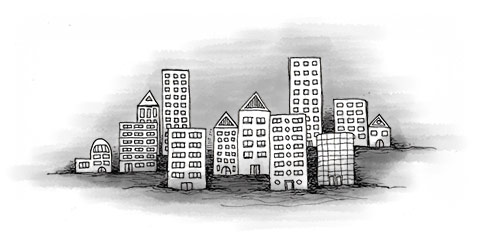Home insurance
French law requires a tenant to be insured against the damage to the property (assurance d'habitation), so we recommend doing this as soon as possible. A standard multi-risk insurance covers damage from fires, storm damage or ground movement. You can then choose from different options such as third-party liability (responsabilité civile), which usually covers all people living the flat and theft (you define the value of your personal belongings), etc.
Everything is subject to the specific terms and conditions in your contract. Standard contracts are annual with automatic renewal. You might be obliged to give 2-3 months notice to cancel the contract. If you need more flexibility, there are expat home insurances that are cancelable anytime and provide fully English support.
Local taxes
Nearly everyone living in France has to pay local taxes (taxe d'habitation). You have to be registered at the local town hall but usually the landlord will do this, as they pay a related property tax (taxe foncière).
The full amount of the taxe d'habitation is paid annually by the person(s) occupying a property on the January 1st. This means that if you move in on the January 2nd you will not need to pay until the next year. You will receive a payment notice in October and the tax must be paid by the 15th December.
Tax amounts vary depending on the size of the accommodation and the spending levels of your local town hall, department and regional authorities. The amount will be probably be equivalent to or less than one month of rent.
Electricity and Gas
Electricity and gas services are provided by two public sector companies: EDF and Engie.
If your accommodation is already equipped with an electricity and gas network (highly probable), you need to contact the nearest EDF/Engie office and you will be connected in a day or two. Connection will cost around €15. The electric supply is the same as in other European countries: 220/240V and 50Hz. Gas is relatively cheap in France, so an electric heating bill for winter could be 2-3 times higher than one for gas.
Telephone and other connections
Orange is France’s main provider that can connect you to the fixed telephone network. However, for all other telephone services (local and/or long distance communications, international calls, internet access, etc.) there are a number of alternative providers. As this is an area where you can save a lot of money, we have dedicated a whole section to Telecoms, where there is also information about cable TV and broadband internet connections.
Waste collection and recycling
Rubbish collection is paid for from local taxes. Collection frequency varies; usually daily in big cities or 2-3 times a week. Apartment buildings usually have a bin area, but this does not always include separate bins for recyclable waste. Glass recycling containers can be easily found at supermarkets or in public areas. The availability of containers for other recyclable waste depends on the environment-friendliness of the local authority.
Disposal of dangerous waste (including chemicals, batteries, motor oil) in normal rubbish bins is prohibited by law. Town halls and many supermarkets have bins for used batteries. Unwanted medicines can be left in pharmacies. Motor oil should be disposed of by a garage.
Furniture and appliances
Furniture and appliances can be bought in many chains, from big hypermarkets (which provide economic solutions for many items) to specialists in fields like furniture, electric appliances, carpets and other floor-covers, DIY goods, etc.
If you're on a low budget, we recommend checking small second-hand shops in your area (especially for refrigerators and washing machines, check leboncoin). In Paris or larger towns, another option is just to look around in the streets. Many people just put old furniture and big household appliances on the street as it is too complicated to sell them when they buy the new ones or move to a new place. You can sometimes find decent furniture and working washing machines, refrigerators, TVs, etc. for free. A Just Landed member equipped 60% of his flat in this way, including a 3-year old dishwasher, which even had the manual inside it! Although recovering furniture in this way is a very economic solution, 'dumping' unwanted large items (such as furniture) in the street is illegal in many cities. Contact your local town hall (mairie) if you wish to get rid of such items and they will arrange for it to be picked up. The evening of the day before the arranged pick-up date is the only time you can 'legally' dump your stuff on the street.




